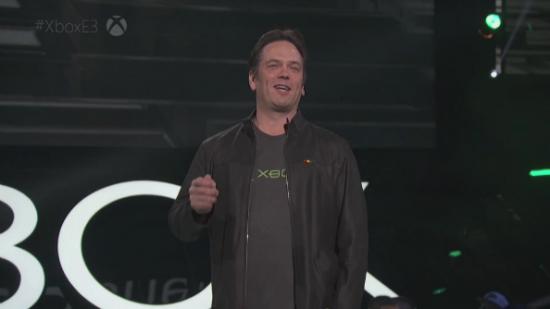Microsoft had a lot to say about PC gaming during last night’s Xbox conference at E3 2016. In fact, the words ‘PC’ seemed to occupy that same space on the script that ‘TV’ did in the Xbox One’s ill-fated reveal, spoken frequently and with emphasis. But what do all the platitudes and friendly nods to our platform mean, in a real sense? Head of Xbox Phil Spencer sat down with PCGamesN to explain the finer details of Microsoft’s plan for PC gaming, and how it fits in to the company’s wider gaming ecosystem after announcements such as Play Anywhere, and the 4K gaming console project, codenamed Scorpio.
Related: Check our guide to the best gaming keyboard.
PCGamesN: With so many games coming to Windows 10, and Play Anywhere, PC is obviously a big focus for you this year…
Phil Spencer: It takes time – we learn from doing. Not all of our PC launches these past months have gone seamlessly. We’re learning. But I was proud, as somebody who started at Microsoft when all we did was PC games, to see… I laughed a little bit when I watched the show and saw how many times “Windows 10 and Xbox One exclusive” came up. But it’s true! And then we announced Play Anywhere, which is our cross-buy support that we’re doing with our first party games, and encouraging third-party games to sign up. It was really great to see how many times Play Anywhere came together, and I think it’s good value for console customers. It’s nice to feel like we’re growing in capability in PC gaming.
What do you think PC gamers want from Microsoft?
I’d say first and foremost, making Windows a good platform to run your PC games on. That’s not always the ‘on stage at E3 talk’, but I think DirectX 12 is a solid upgrade on DirectX 11. For those of us that have been in the PC community for a while it always takes a while for the maturity of the drivers and the games to take full advantage of it, but I think that most people, when they look at the technical features we’ve put in DirectX 12, think it’s a good advantage over DirectX 11. Even things like Start menu and other, I won’t say silly things, but smaller UI things that we did in Windows – most of the Windows core people that I interact with will say that Windows 10 is a better gaming platform than Windows 8, and that’s great to hear.
I’d start there, and then on top of that I think we have to support the third-parties that PC gamers rely on today: Steam, middleware providers, I think that’s important, because those are companies that have shepherded the PC gaming community for years, and it’s important that we maintain our platform focus in being a supporter for those, and not trying to do anything – I won’t say never disrupt as platforms and capabilities move – but try to be inclusive of what all the partners are trying to do on the platform.
We put the gamer at the centre of what we’re trying to do and say. The first thing we did was put the Windows app on Windows 10, which let you stay connected to your Windows Live friends list even when you weren’t on console. We’re starting to see more and more use of that for people who don’t own an Xbox console – they just use it as a way of staying connected socially to their gaming friends. Features like game DVR, game hubs for Win32 games are good feature adds.
I think it all eventually boils down to [this]: we’ve got to deliver good PC games. PC gamers want to play good PC games. Our first games we launched on PC were going to be games we started on console that we then brought over to PC, and some of them showed that. But going forward, building games that have that ethos of what PC gaming is about more built in from the beginning, whether that means they’re PC-only or PC and console, I think that’s important.
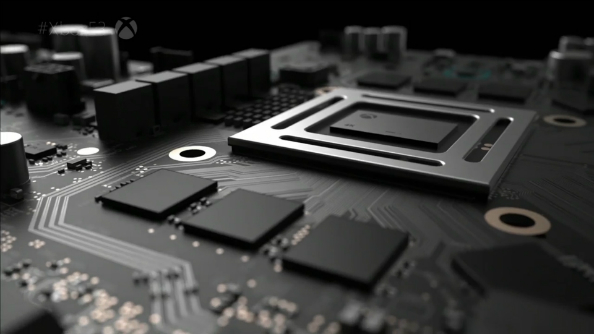
Presumably Play Anywhere necessitates closing the gap between console and PC versions – there needs to be less of a divergence.
That’s right, and that’s why I don’t think Play Anywhere is for every game, because you will have games that are console-only and you will have games that are PC-only. I don’t want people to look at Play Anywhere and see it as our desire to get rid of our unique PC games, or get rid of unique console games. But there are games – I’ll use Gears 4. You look at Gears 4 and you say ‘ok that’s a game I can imagine playing on PC and on console’, and I’d love it if you played on both. I don’t want to sell you two copies of the game, that’s silly. To enable you to play on both, I think that works. Then take… League [of Legends]. Trying to take League and play it with a controller… or Dota… I don’t know, maybe a designer’s going to try and tackle that problem, but those seem like natural PC games to me. And I think that’s fine, and in that scenario you can still be an Xbox Live game and still be connected to all your friends, your save game can still flow with you from PC to PC. When we enable PC and mouse on console it’ll be interesting to see how many of those creators think about running their PC and mouse-only game on console, and then this idea of Play Anywhere might get even more interesting for those guys.
I think the ship dates being close together is going to be important for Play Anywhere, I think the ‘go to market’ muscle around ‘Hey, they’re all available now, go get them’, and keeping the features and updates in sync will be important.
You say ‘when’ for PC and mouse – is there anything more you can say about that?
I keep talking about it in the press and my platform team keeps shaking their head, because they… Truthfully in our dev kit modes now keyboard works, mouse support is a little bit further away. I say it because I know it’s not years away, it’s more like months away, but we don’t have an exact date yet.
There’s some frustration and confusion from PC gamers in terms of why we get some games but not others – we’re getting Halo Wars 2 but not the core Halo games, for instance. Can you let people in on the strategy or principles that guide those decisions?
What we’ve said going forward is for our big franchises we’re going to build them for both Windows and Xbox. That doesn’t mean we’ll never do a game that only works on one platform, because we might. In terms of specifically Halo 5, because that’s one I get asked about a lot, honestly the trade-off for us is twofold. One, Halo 5 was designed to be a console shooter. When we started the development and built that game we didn’t build it with the idea in mind that it would come to Windows. The bandwidth of the team at 343 and what we have them go do next, and making a true experience that I think could be great on both PC and console, that’s a trade-off of ‘do you look back or do you look forward?’ Here’s what I’ll say. Halo 5 is not on PC in order for you to go buy an Xbox One – that’s not why we’re doing it.
We’ve announced we’re going to bring [Halo 5 creation toolset] Forge over and allow multiplayer – I’m curious to see how that does. It’s a little bit like Forza and Apex. We did this game because we wanted the team looking forward, but we felt like we could get something into the PC space, get feedback on what they wanted. You should think about Halo and Forge the same way. Our long-term goal is to support both platforms, and it’s just the fact that Halo 5 shipped when it did and was finished when it did. It’s just ‘do you look forward or do you look back’ – it’s just a trade-off of resources.
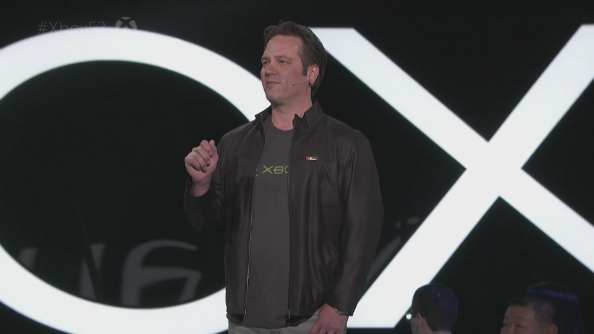
Regarding Steam and distribution platforms, how is the Windows 10 store performing for you guys?
It’s early days. It’s getting better with every game that comes out. With Tomb Raider it was great to have the partnership with Square Enix but it shipped the same day it did in Steam, and most customers are just going to buy it in Steam because that’s where they’re comfortable buying games. We’re going to have to continue putting our own content in the store so that we learn from doing, and learn what the experiences are that gamers want. But we’re really early.
I will say that I feel good about every incremental release from a Store standpoint getting better. I thought the Apex release of Forza went really well – granted it was free so you’re going to get more downloads! Killer Instinct went really well, Quantum Break didn’t go really well, but I don’t know if that was a Store scenario honestly. If I just think about the features that we finished in that game for PC and were they all there… that’s kind of a different point. But the Store is definitely something that we remain totally focused on.
Giving gamers on PC a choice about where you buy – you’ve got GOG, you’ve got Origin, Steam – I think having another Store to offer more choice to you as a PC gamer I think should be a good thing. I know that there are certain people that just yell at me to go put everything on Steam…
It does seem that people get frustrated about that. Choice in in itself isn’t a bad thing, but it must be hard for each distribution platform to move people away from Steam as it’s just built into the landscape. There’s also the issue that publishers and developers feel comfortable with Steam – so it must be difficult to move both away to something different.
I’m not trying to move people away from Steam. We sell games in Steam. I haven’t taken games that are in Steam away from Steam. Even Ori, that we shipped originally in Steam, when we put out the Definitive Edition we made the decision that we were going to put that one in Steam as well, because the community we there. Something like Quantum Break of Forza – Forza’s never been in Steam – so I’m not trying to pull people away from it.
But you have the Store, you must want people to use it…
Absolutely, I want to build a good store, and I think our first-party content is critical in helping us learn what it means to build a good store. Gabe, Scott, Eric, the guys at Valve I know incredibly well – in fact I disclosed them on Scorpio before we announced it on stage. They are partners with us in so many ways, and we’ve both said this publicly. There are going to be areas where we compete, and areas where we cooperate. I think it’s good for gamers what we’re trying to get done. Most of the PC gaming purchasing that happens actually doesn’t go through Steam, most of it’s direct – like Riot does all of their transactions direct. There are a lot of marketplaces, whether it’s in-game or things like Origin and Steam and GOG. I think as the platform holder we can build the capability for developers to sell content to our stores well, but I think it’s just about choice. Steam is on an incredible growth path – I think they’ll be bigger in a year than they are now and I think they’ll be bigger three years from now than they are next year. I’m pretty confident in their health and growth.
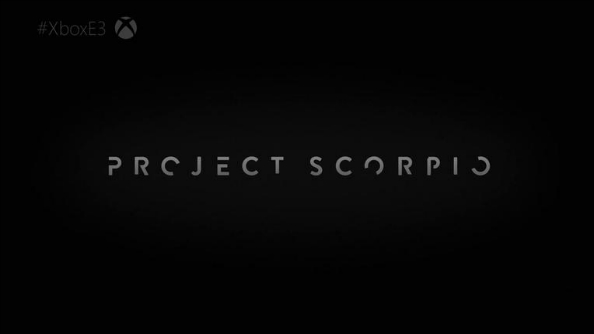
Talking Scorpio – 4K gaming on a console has the potential to influence PC gaming because of how it’ll affect cross-platform development. Things should be more coherent in that sense…
I’ve done a lot of console press this morning so it’s good to get a PC outlet coming in to talk about it, because I think you’re exactly right. We actually designed Scorpio at first by going out and talking to creators about what they were seeing on the horizon and what they wanted to take advantage of. 4K we’ve seen in the PC space – I won’t say it’s not new, it’s relatively new – but it’s something that most of your big PC games will try to hit. We did with Forza as well, and most of them are doing a good job of it.
We talked to them about what technical capabilities you really need to go do a 4K game – the 980’s a really popular card for doing 4K games, so we said ok six teraflops seems to be what we’re going to need to put into this console. At the same time we watched the television space go and you see a lot of 4k televisions starting to get purchased, you see 4K monitors start to be a thing that people are purchasing, so I think you’re right that we’re adapting to what we see the high-end gamer and game creator doing. Us creating a console price point that can support 4K with six teraflops, which I think is what you need to do ‘real’ 4K gaming, is going to make it a little easier for all developers out there. Just like we have in [graphics] cards, there are certain cards that have a spec that get real market share, then when you’re going to create your recommended spec or your min spec you’re going to look at where all these things cross, and I think Scorpio will help create a good 4K spec. A lot of people on the PC side will go beyond what Scorpio has.
We’re still 18 months away from when Scorpio will come out, and while the spec is extremely high for a console, from a PC perspective in 18 months we’re going to be even further ahead. Is it just a question of price point that stops you going higher?
Yes. We haven’t talked about price yet but I want it to be a console price point, I want to give creators the time to get ready for that spec as well. We see this in the PC space – PC’s a little different in that a lot of developers build their games a little more scalable than they do in the console space, usually a lot of the scaling that happens on consoles is just between different platforms. But if you take a card like the new Nvidia card it’ll take a while before we see games that are really taxing what that’s doing. As AMD continues to roll out their technology it’s the same thing.
So we announced Scorpio so that the creators could get ready for when it comes out, but somebody who wants 6K, somebody who wants to run all their games with unlocked frame rates – the PC space is great. We built this with Play Anywhere because I think there will be people that move back and forth – we know that a lot of our best console customers own a PC and play there, and a lot our best PC customers own a console and want to play there. But PC is a great innovation space for hardware, and I want to watch what happens in the game space and find these inflexion points – like SD to HD, 4K – and if there’s the right time and place to put a new console in market that can help capture that then we’ll do that. I think 4K is that, and six teraflops is what we needed.
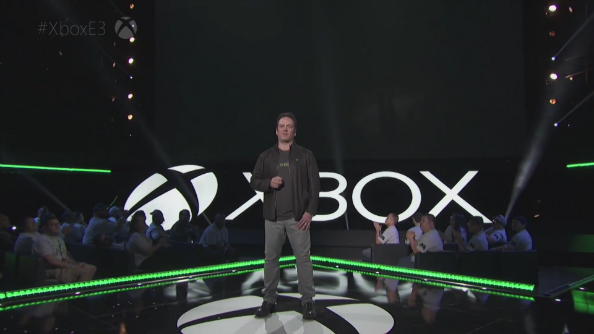
But will consoles be a gating factor, or will games built for Scorpio still be able to scale with superior technology?
[They won’t be.] We’ve seen this in the PC space. Every game that comes out has a recommended spec, and developers will decide how much beyond the recommended spec they want to push. I think having these consumer points where we know there’s volume is a good thing for developers, because the game industry is all around developers being healthy and successful and building great games that people buy. So if there’s a large install base of people who buy at certain price points and certain capabilities I think that’s a good thing. With our Universal Windows Platform, making sure developers have the capability to go to 6K, go to 8K – whatever they want to do with our platform – is critical.
Because consoles plug into TVs it’s a little different in their ability to take advantage of all that. HDR is one of the things we’ve added – and HDR even within the PC gaming space, some games use it, some games don’t. We think we can even help with the adoption of HDR gaming, that’s why we support HDR gaming on the Xbox One S and on Project Scorpio. I’ve seen some really interesting results from one games when they show me their HDR builds, but not all games are doing it. I’d love to see PC monitors support HDR and game developers go utilise it.
As far as VR goes, what do you think of its current standing as a gaming platform?
We’re early. We’re really early. The idea that I take a game that was designed for 2D and 2D input, and port it to VR, which is still kind of what I feel like we have – I don’t mean that as a bad thing, it’s kind of the basis of the canvas that you start with … The reason that our focus on VR has been with PC and ensuring that Windows 10 is a great place for all of the people building head-mounted displays today, and working with Oculus and working with Valve and HTC, to make sure their devices work great on PC, is because I think PC is a great place for innovation and creativity to flourish.
I don’t want to close down VR. Certain people are out there trying build their closed end-to-end ecosystem around VR, and it feels way too early to do that for me. I like some of the VR experiences, but I don’t think the whole industry shifts to VR. We’re really focused on PC gaming and console gaming, and I’m not trying to turn everybody into a VR gamer. That social, in-the-room experience that a lot of us grew up with and love is something that we’re not going to lose sight of, we’re not going to get distracted. We want to support VR and innovation as it happens, but really remain focused on the businesses we’re in on Windows and console.
It seems like VR gaming will only hit the same quality as the best ‘traditional’ experiences is when people make games that are only for VR. If we then want VR of that standard, does that not mean we’re going to have to move people away from traditional experiences and into VR?
I don’t know. I think what you’re going to see is new studios build up that say ‘We’re going to build VR’, and try that out. You’ll see some things, like Todd Howard saying ‘I’m going to bring Fallout 4 [to VR]’, but Bethesda’s always been really great about experimenting in new places and seeing what happens.
But the idea that I’m going to take a 2D game and simply try to spread it over a broader canvas… There’s certain things like Minecraft that happen to work fairly well, but it’s almost serendipity based on just what the game is. I think you see new studios being built focused on VR, and if VR gets to scale adoption then you’re going to see bigger games get built there. Right now as a an industry I think we’ve seen incredible growth in PC gaming over the last five, ten years. Console gaming has never been stronger – Sony’s selling incredibly well, we’ve sold more Xbox Ones than we had 360s at this time in the generation. Focused on people playing games – keyboard and mouse, controllers, feels like a real good spot for us, and it’s a healthy place in the industry. As VR grows I want to be a platform that can support that, that’s why, again, the six teraflop number was what developers like Todd [Howard] were telling us they needed to support those high-end VR experiences.
But if VR gets to scale and there’s 20, 30 million VR devices out there I think you might see studios building some high-end VR games that are only VR, but I think we’re quite a way away from that if I just look at the numbers.
